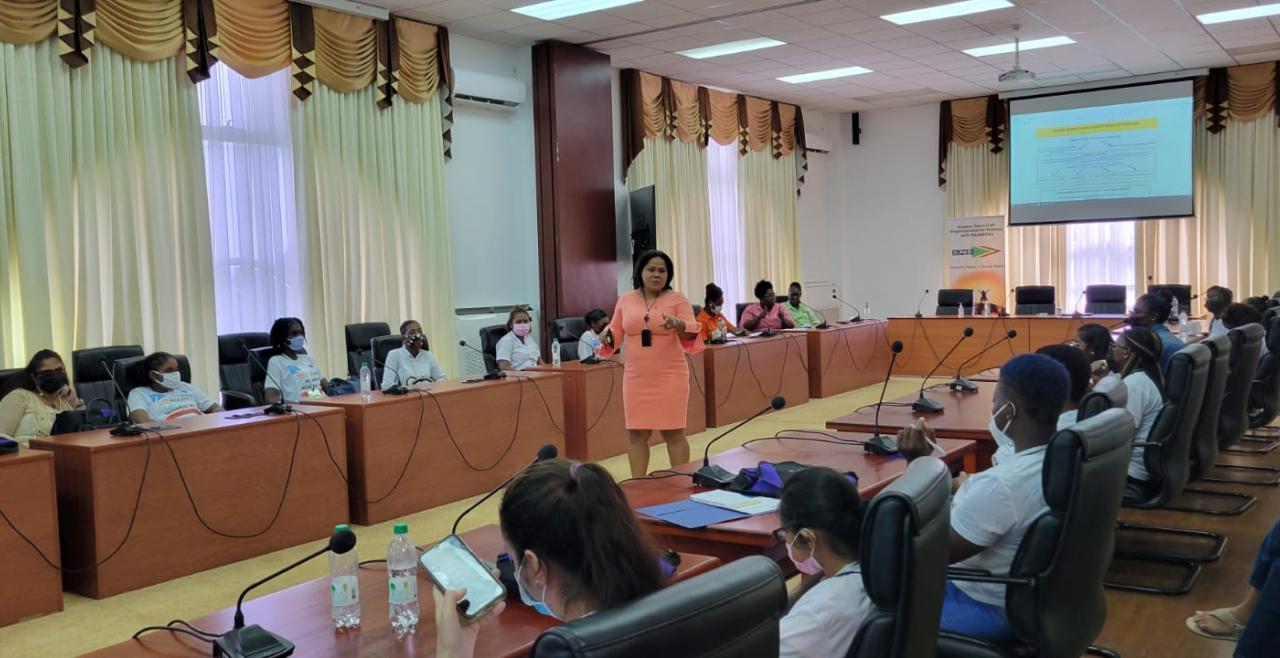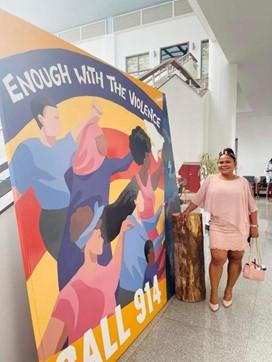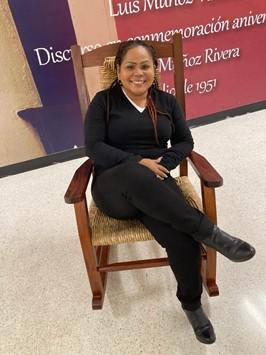"We need to talk to survivors" - In Guyana, a gender-based violence survivor finds purpose helping others

GEORGETOWN, Guyana - From the outside, the de Florimontes looked like an average, well-to-do family. Mr. de Florimonte was a well-respected senior journalist, his wife was a nurse, and they had nine children together. But Mr. de Florimonte had a habit of consuming alcohol. When he imbibed, it had an immediate effect on their Subryanville, Georgetown home. This would lead to conflict in the home.
As the youngest child, Ms. de Florimonte recalls reciting the prayer “The blood of Jesus”. It was taught to her by one of her sisters, who used her faith to comfort her siblings.
“Abuse doesn't happen 24/7. There are beautiful days or months with love and affection... And so, oftentimes, our brain tends to block out the bad parts.” - Gender-Based Violence (GBV) Coordinator for UNFPA Guyana Wemyss de Florimonte
“To this day, I can’t hear that thing without getting upset,” says Ms. de Florimonte. “That cycle continued throughout my childhood.”
Ms. de Florimonte never doubted that her parents loved their children. Now 49, the Gender-Based Violence (GBV) Coordinator for the United Nations Population Fund (UNFPA) in Guyana believes that her parents did their best with the knowledge that they had.
“My father’s ideology was deeply rooted in patriarchy,” she says. “He also served in the Guyana National Service. When he came home, the whole house had to be clean. Food had to be on the table. If not, everybody had to be uncomfortable.”
In a house of 11 people, she often felt invisible and sought attention elsewhere. At 15, she became pregnant by her 17-year-old neighbour. When the relationship didn’t work out, Ms. de Florimonte, now a teenage mother, entered a new relationship that resulted in abuse.
“Abuse doesn't happen 24/7. There are beautiful days or months with love and affection and then there's the abuse, and when that happens, we know that it's going to end; we look forward to the next phase,” she says. “And so, oftentimes, our brain tends to block out the bad parts.”
After several attempts, Ms. de Florimonte finally left her partner for good following one particularly violent episode. She says that her father was instrumental in giving her the courage to leave by letting her know that she was always welcome to return home if she was unhappy.
Finding purpose through social work
Ms. de Florimontes dropped out of school to take care of her daughter but decided to complete her high school education at the age of 30. She later gained a degree in social work and says her studies helped her heal from her trauma.
"We can make a difference with Spotlight Initiative because it addresses gender-based violence or violence against women and girls from all these different angles." - Wemyss de Florimonte
“I told myself, ‘I am going to study social work, and it will heal me. I want to understand how to be a better parent, how to get over this [trauma] and the way that I respond to situations. As a parent, I sometimes used to lash out at my children,” she says, “I recognized I was traumatizing my children because of my trauma.”
What started as a journey toward self-healing turned into a passion for helping others. She quickly became a pillar of support for the other women in her course. “So many women have gone through these things, and they're still going through it,” she says. “I think because of my [outspoken] personality, they found it easier to talk to me, so I started being the unofficial class counsellor.”
Since graduating, Ms. de Florimontes has worked as the Head of the Women of Worth programme with the Ministry of Human Services and Social Security, providing small business financing for single-parent women at low-interest rates, among other roles.
She continues to help women and girls through her work with the Spotlight Initiative.
Changing the culture
“Gender-based violence is systemic. It's rooted in all of our practices, our norms, our institutions, so addressing gender-based violence requires a multi-sectoral, multilayered as well as a community-centred approach,” says Ms. de Florimontes. “We can make a difference with Spotlight Initiative because it addresses gender-based violence or violence against women and girls from all these different angles.”
Despite some progress, she says more must be done to create cultural change so that women can come forward, share their stories and have the courage to leave violent situations.
“I am a fighter, always,” she says. “And I was always taught to speak out and not be afraid. But [society] denigrates women so badly. [It’s] as if we don't understand that this is something that all of us might have grappled with - whether personally or through interactions with a survivor. [We need] to talk to survivors. Let us support them, let us work with them, let us remind them that many of us went through this but by the grace of God, came through. Support is everything.”
By Jasmaine Payne
A longer version of this story was published in The Guyana Chronicle.


